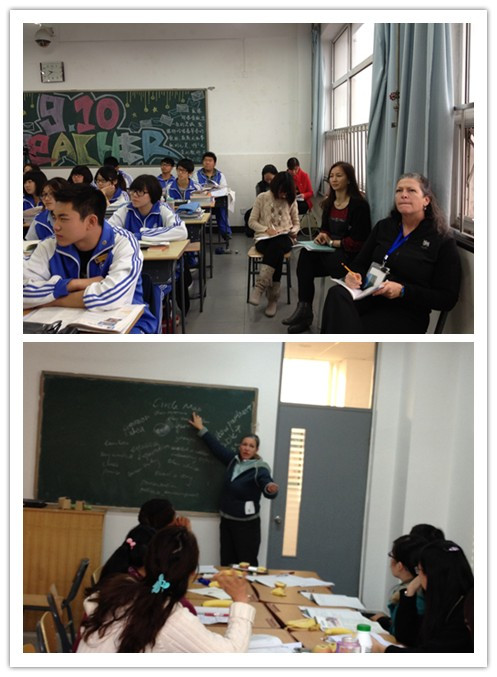·我校高中外語教師及外教教學(xué)交流感受集錄(中英文)
發(fā)布日期:2012-11-20 信息來源:
前言:我校高中外語教研組與外教一起開展教研活動,通過互相聽課評課,,交流教法,開闊了我校外語教師的視野,,拓寬了思路,也使得外教更好地融入中國的文化,適應(yīng)在中國的教學(xué),,以期在整體上提高我校高中外語教學(xué)教研的質(zhì)量,。
l 介紹
-----Cynthia Zaitz博士
在北京經(jīng)常能看見外教的身影,這充分證明目前很多中國人都非常想學(xué)習英語,。由Robert Wyss Jr.(文學(xué)碩士)以及Emily A. Thrush(哲學(xué)博士)編寫的《在中國教授英語》一書的封皮上出現(xiàn)了這樣的字樣“由外國專家局推薦”,,這也顯示了中國政府更加認同和接受一些英語母語國家用來幫助學(xué)生說一口流利英語的更為成功的教學(xué)方法。
我最近與一些中國同事就英語教學(xué)目標和方法的相似性及差異性進行了探討,。我發(fā)現(xiàn)我們的教學(xué)目標非常相似,,但所采取的教學(xué)方法卻顯然不同。我們都希望學(xué)生能夠?qū)W好英語,而且也都夜以繼日地努力尋找如何能增強教學(xué)效果,、提高學(xué)生英語流利度及理解力的教學(xué)方法,。因此,我們決定共同寫一篇文章,,主題就是“我們從彼此那里學(xué)到了什么”,。我們討論了如何能給讀者生動展示與來自完全不同文化的外國專家一起工作的益處。在這篇文章中你會看到我們每一個人的觀點,,以及我對高中外語教研組做過的公開課的分析和整理,。
l 在完成教學(xué)目標的同時要保持對學(xué)生的耐心
----高中英語老師張晚霞
我認為,通常中國的英語老師在僅僅只有四十分鐘的一節(jié)課里要處理至少三個教學(xué)目標,。所以老師們不得不趕進度,,有時候很難保證每個學(xué)生都能參與進課堂中。相反,,外教一節(jié)課只有一個教學(xué)目標,,也足夠有耐心等待學(xué)生慢慢思考和回答問題。
我從Cynthia博士那里學(xué)習到了耐心對于一個老師的重要性,。只有有耐心,,一個老師才能鼓勵每一個學(xué)生參與到課堂中,只有老師有耐心了,,學(xué)生才能自由展示自己的想法,,逐漸產(chǎn)生對英語的興趣,并最終掌握這門外語,。我以后要在自己的教學(xué)中控制課堂節(jié)奏,,對學(xué)生更有耐心。
l 課堂管理之課堂上學(xué)會“拒絕”
-----高中英語老師王晶
課堂管理本身就是一門藝術(shù),。所有的老師都希望自己的課堂活躍積極,,使得更多的學(xué)生融入到課堂之中。然而在過于活躍的課堂上很多同學(xué)想爭搶著展示自己,,亦或思維敏捷的學(xué)生總是第一個說出答案根本不留給其他人思考的時間,,這種課堂表面看起來豐富活躍,但是并不能使每個學(xué)生受益,。思維敏捷的同學(xué)和那些爭搶著回答問題的同學(xué)的行為并不應(yīng)該受到批評或忽略,,因為那些孩子的積極參與為課堂本身創(chuàng)造了價值,我們也需要維持他們的興趣,。但是他們“搶奪”了所有的機會,,我們又如何聽到其他孩子的聲音?因此適當?shù)木芙^提問他們,將機會留給其余的學(xué)生,,讓所有的同學(xué)都學(xué)會耐心,學(xué)會向?qū)Ψ綄W(xué)習,,學(xué)會傾聽他人,。
小孩子都有一種表現(xiàn)自己的強烈愿望,,老師的鼓勵與表揚更會促進他們的踴躍發(fā)言。但是很多老師,,包括我自己以及其他教師都想將課堂提問的機會給與每個學(xué)生,,看到每個學(xué)生的反饋與進步,因此無論那些“優(yōu)等生”怎樣一直舉著手不放或是在老師眼前不斷揮舞自己的右手,,最終都會被“忽略”沒有任何語言的安慰,。由此老師可能在不知不覺中打擊了他們的積極性以及英語語言學(xué)習的興趣。
而這點我在聽Cynthia公開課上就得到了很大的啟發(fā),。在她的課堂上也是有那個兩三個學(xué)生總是搶著回答問題,,甚至還沒等老師講完他的答案就說了出來,其他的學(xué)生根本沒有思考時間,。同時其余學(xué)生也是很有進取心想自己探究出答案,,當聽到已經(jīng)報出的答案時,也是有不滿的情緒,。當Cynthia發(fā)現(xiàn)這一問題時,,她用誠懇與贊賞的眼神看著那位學(xué)生就簡單的說了幾句話:“‘我知道你已經(jīng)找到答案,但是我們能不能把機會留給其他人,?’‘我很高興你知道答案,,讓他們自己找答案是不是更好?’‘我知道你一直都做得很好,?!本瓦@些簡單的語言馬上就讓他安靜下來,耐心地等待傾聽別人的答案也沒有任何沮喪的表情,。
之后我將從外教課上學(xué)到的技巧應(yīng)用到自己的課堂上又看到了他們的自信與微笑,,這也讓我倍感欣慰。
l 我對英語教學(xué)的理解
----高中英語老師楊健雅
當我設(shè)計課程的時候,,一般會優(yōu)先考慮課文目標,。這樣,我所有的教學(xué)步驟都會緊緊圍繞我的教學(xué)目標,,使每一步驟都連貫有意義,。在我看來,一個年輕的英語教師應(yīng)該練習掌控整個課堂的能力,。這意味著我們課堂進行的每一步驟都得事先周密的計劃好,。這樣在實際課堂中年輕教師會更有自信和熱情,不顯青澀之感,。
Cynthia是一位很能把握住課堂局面的外教,。在她的課堂中,她很清晰的明白老師做什么以及如何把學(xué)生代入到每一個環(huán)節(jié)。和中國教師不同的是,,她的課堂中永遠是學(xué)生為主講人,。學(xué)生在她的帶動下,能夠積極參與課堂,。同時,,她的一些教學(xué)方法頗具特色,例如讓學(xué)生輪流互相提問,,繪畫思考地圖等值得我們中國教師借鑒和學(xué)習,。
我認為外國教師在組織不同的課堂活動中更具經(jīng)驗。他們會在課堂展開豐富多彩的教學(xué)形式使得課堂更加生動有趣,。我們中國教師應(yīng)該借鑒與此從而進一步完善自己的課堂,。
l 作為外國專家在北外附校教書
-----Cynthia博士
在北外附屬外國語學(xué)校教書對我來說是一個很特別的經(jīng)歷。在這里,,不僅有中國英語教師運用傳統(tǒng)教學(xué)方法教授英語,,也有像我這樣運用不同的教學(xué)方法進行教授的外國專家。通過我觀察,,中國教師最常規(guī)使用的是機械教學(xué),。這和我個人教學(xué)風格很有差別,我習慣與學(xué)生頻繁互動,,小組活動,,讓學(xué)生積極參與課堂。
根據(jù)Robert Wyss Jr. M.A.,和Emily A. Thrush博士,,我同事所采用的傳統(tǒng)教學(xué)法在亞洲很盛行,。在《在中國教授英語》一書中,他們把這些傳統(tǒng)方法描述為“語法翻譯法”,。
語法翻譯法仍是在中國乃至亞洲大部分區(qū)域的中學(xué)課堂中所推崇的一種教學(xué)方法,。這種方法被推崇的很大一個原因是它是幫助學(xué)生準備通過國家英語考試的可靠手段。在這些考試中,,包含了大量的語法和詞匯練習,,而口語的部分則恰恰缺失。所以學(xué)生通過用心背誦英語長篇課文來學(xué)習的方式與不足為奇,。但是,,如果一個學(xué)習者有著令人欽佩的英語詞匯和語法知識,甚至對于古典文學(xué)頗為熟知,,有時候他也不能做到在每天的實際生活場景中交流自如,。
我的專業(yè)領(lǐng)域是創(chuàng)造性和互動性教學(xué)課程設(shè)計。我采用的是Wyss和Thrush所指的“交際語言教學(xué)法”,。交際語言教學(xué)法和語法翻譯法對于老師在課堂的角色涉入有所不同,。語法翻譯法中,,教學(xué)是智慧的提供者,而在交際語言教學(xué)法中,,老師充當?shù)氖且I(lǐng)者,,幫助學(xué)生獨立思考并且互相分享學(xué)習的責任。如果將這兩種教學(xué)風格融合到一起就能使得學(xué)生更好地備戰(zhàn)國家英語考試,,并且與此同時讓他們在出國時更有自信地與外國人交流。
在北外附屬外國語學(xué)校中,,中國的英語教師總是讓學(xué)生以小組為單位進行閱讀,。我認為這種形式會很難在形式上評估個人能力,并且有可能使得個別有理解問題的學(xué)生會被不經(jīng)意的忽略掉,。然而,,我同樣認為這種方法可以讓老師快速提供大量信息給學(xué)生,并且?guī)椭麄儜?yīng)對考試,。
l 英語外教Cynthia Zaitz博士簡介

我(Dr. Cynthia Zaitz)于2012年九月來到北京,,任教于北外附校高中部以及北京外國語大學(xué)。我來自于美國卡羅拉多州奧羅拉市地球村學(xué)院,。在那里我教授7年級和8年級學(xué)生英語語言文化以及文學(xué),,以及為在校所有學(xué)生教授戲劇,鼓樂以及交誼舞,。地球村學(xué)院是一個多元素的學(xué)校,,學(xué)校設(shè)置的語言課程有漢語、西語,、法語,、俄語。學(xué)生也來自己不同的國家,,大多學(xué)生也將英語作為第二語言,。因此,地球村學(xué)院的老師在這樣的語言環(huán)境中需要很強的語言感知力和耐心,。
地球村學(xué)院為老師們提供很多專業(yè)發(fā)展的渠道,。我們經(jīng)常組織會議討論最前沿的閱讀教學(xué)方法以幫助學(xué)生明確良好地閱讀能力對他們的幫助以及增強閱讀資料的理解能力。因為閱讀對于母語習得者是很困難的事情,,更何況對于那些一英語為第二語言習得的學(xué)生,。
在地球村學(xué)院任教之前,我在佛羅里達亞特蘭大大學(xué)任教,,也是在此我獲得了我的對比研究方面的博士學(xué)位,。不過在此我主要教授表演、戲劇,、音樂史,,在擁有300人容量的大課堂里,,我更理解到學(xué)生參與的重要性。作為一個擁有奧爾夫教學(xué)法資質(zhì)的教師,,我致力于培養(yǎng)學(xué)生的創(chuàng)造力,、自信心、個性以及團隊協(xié)作能力,。
Cynthia Zaitz博士擁有9年的專任教師經(jīng)驗,,獲得佛羅里達州及卡羅拉多州在英語,音樂,,戲劇等科目的教師認證,,肯塔基大學(xué)的奧爾夫三級認證證書;丹佛市Bridge Linguatech的英語外語教學(xué)認證等,。
博士 佛羅里達亞特蘭大大學(xué) 對比研究專業(yè)
碩士 肯尼迪大學(xué) 意識研究(哲學(xué))
本科 加州大學(xué)歐文學(xué)院 戲劇研究

圖為我校高中英語教師與外教Cynthia Zaitz博士一起聽課(上)
英語外教Cynthia Zaitz博士與我校英語教師教研(下)
The Benefits of Collaborating with Foreign Teachers
By Dr. Cynthia Zaitz, Zhang WanXia aka Meg, WangJing aka Cathy,
and Yang JianYa aka Misty
Introduction by Dr. Cynthia Zaitz
It is clear that many Chinese have a strong desire to learn English as evidenced by the abundance of foreign teachers here inBeijing. The book “TEFL: Teaching English in China” by Robert Wyss Jr. M.A., and Emily A. Thrush Ph.D. is endorsed on the cover as follows: “Recommended by Department of Culture and Educational Experts, State Administration of Foreign Experts Affairs”. This endorsement highlights the desire of the Chinese government to assimilate and better understand some of the more successful teaching methodologies used in English-speaking countries for helping students to speak English with fluency.
I recently met with some of my Chinese colleagues to discuss some of the similarities and differences in our teaching objectives and techniques. I discovered that our objectives were similar; the methods we use are remarkably different. We all want to see our students succeed and we spend hours upon hours looking for ways to improve our effectiveness and students’ fluency and comprehension. We decided to write an article about what we are learning from each other. We discussed how we might offer a picture to our readers of some of the benefits of working closely with professionals from completely different cultural backgrounds. In this article you will find the individual opinions of each of us, followed by an attempt on my part to analyze and synthesize our observations.
The Importance of Reaching Teaching Goals and Being Patient with Students
By Zhang WanXia aka Meg
From my perspective, a Chinese English teacher usually deals with more than three goals in a single forty-minute class. As a result, he or she has to be in a great hurry to reach all the goals, and sometimes it is hard to make sure that every student gets involved. In contrast, a foreign teacher has only one goal at one time so that he or she is able to be patient enough to wait for students to give answers.
What I have learned from Cynthia is that patience is really important to a teacher. With patience, a teacher will encourage every student to take part in classes. With the teacher’s patience, students feel free to voice their opinions, become interested in English and finally to acquire the foreign language. I think in my class I will control my pace and be more patient.
How to Refuse to Call On Students in Class Without Hurting Them
By Wang Jing aka Cathy
Class management is an art. Teachers all love active and lively classes, and we are happy to see students involved. At the same time, if too many students want to voice their answersall at once, or the smartest students always speak out before the other students, without leaving them the time to think, that might be a bad thing. How can a teacher refuse to call on the smartest students without hurting them? Gentle words with a comforting tone as well as the sincere appreciation of them is a good way to teach them to be patient, to listen to others, and learn from each other. This is what impressed me most while I was attending Cynthia’s class.
The reason why I focus on this point is because of an unforgettable experience I had when I was a junior student. For young students, I am sure they all want to represent themselves well in order to get praise from the teacher. Of course, I was the one looking for approval back then. I love history because I loved my history teacher. She always gave the students a lot of praise when they did a good job. At the beginning of each history class she would have a quiz about what we had learned in the previous class. I was quite good at short-term memory and most of the time I got the chance to represent myself well. However, later the teacher refused to ask me to answer any questions. I kept raising my hand all the time or waving my hand just before the teacher’s eyes but ended up being ignored again and again. I got very upset and refused to speak in history class from then on. At that time I just needed some reassurance from her like "I know you know the answer but can we give the chance to others?” or, “I am glad you know the answer, but I hope she can figure it out too.” or “I know you always do a good job". Now that I am a teacher, I regularly encounter this problem. I believe it is fair to give everyone in my class a chance, and I prefer waiting for the students to say something. Yet I also feel I may hurt those who are just like I was in the past. After attending Cynthia’s class, I learned a lot. I started to adopt this strategy in my class and I saw their confident and smiling faces again, which really delights me.
My Understanding About English Teaching
By Yang JianYa aka Misty
When I design my classes, I always put objectives into consideration first. All my teaching steps are centered on teaching aims, making sure that each step is coherent and meaningful. In my opinion, a young English teacher should practice taking charge of the whole class, which means each step must be well planned before the actual implementation. Thus, we can have more confidence and power during real classes and appear like an experienced teacher rather than novices.
She is a teacher who definitely knows how to take charge of the whole class. She knows exactly what a teacher does and when to get students involved in each teaching step. In contrast to Chinese teachers’ classes, it is the students rather than teacher that speak most of the time. Motivated by the teacher, students participate in every activity passionately. Also, her special teaching methods, like having students take turns to ask questions, and drawing Thinking Maps on the blackboard, are worth paying attention to.
I think foreign teachers have more experience in organizing different teaching activities. Various teaching forms make their classes interesting and attractive. We Chinese teachers should benefit from their ideas to perfect our own classes.
Teaching atBeijingForeignLanguageSchoolas a Foreign Expert
By Dr. Cynthia Zaitz
Teaching atBeijingForeignLanguageSchoolis a unique experience for me because there are both Chinese English teachers using traditional Chinese teaching methods, and foreign experts like myself who bring a different set of teaching techniques and methodologies. What I have observed is the regular usage of rote teaching by Chinese teachers. This contrasts with my personal style which is highly interactive and requires students to speak singly, do group work, and to be actively engaged in lessons.
According to Robert Wyss Jr. M.A., and Emily A. Thrush Ph.D., the traditional techniques used by my colleagues are widespread throughoutAsia. They describe these traditional methods, referred to as the “Grammar Translation Method”, in their book “TEFL: Teaching English inChina”
The Grammar Translation Method (GTM) is still the preferred approach to teaching English in secondary school classrooms inChinaand in most ofAsia. One of the reasons for this is that GTM is a reliable method for preparing students for the state English exams, which consist mainly of grammar and vocabulary exercises and lack a speaking component. It is not uncommon for students who learn this way to be able to recite long passages of English by heart, but, a learner’s admirable lexical and grammatical knowledge of English – and even a keen familiarity with classic literature – sometimes goes unaccompanied by the ability to communicate in everyday “real-life” contexts. (23)
My area of expertise is creativity and interactive curriculum design. I use what Wyss and Thrush refer to as “Communicative Language Teaching (CLT)” (23). Communicative Language Teaching and Grammar Translation Method involve different roles for the teacher. Whereas with GTM the teacher is the supplier of wisdom, with CLT, the teacher acts as a facilitator, helping students to learn to think independently and to share responsibility for their learning. This blend of teaching styles results in students being better prepared for the state English exams, while concurrently preparing them to be able to confidently communicate with English speakers when they go abroad.
At Beijing Foreign Language School Chinese English teachers often have students read as a group. I would argue that it is difficult to assess individual ability in this format, and that there is the possibility that students who may have more difficulties in comprehension could be inadvertently ignored. However, I would also argue that this technique allows teachers to present a great deal of information to students quickly and prepare them for the state exams.
Since moving here and beginning to teach high school atBeijingForeignLanguageSchool, I have had to discover the ability levels of my students fairly quickly. Two of the biggest problems my students face are that, while they can usually read English well, and recite it correctly much of the time, they are often reluctant to speak individually and for many students comprehension is a problem. That said, I am impressed by how capable, bright, funny, and curious my students are in general.
One of the biggest mistakes I see language teachers make, whether inChinaor inAmerica, is that they talk too much and their students talk too little. A great deal of contemporary research has shown that while students have many different learning styles, more content is retained when students make personal connections and are engaged with the material rather than when they must merely sit and listen to instructions and explanations. This is not a new concept inChina; Confucius is credited with saying the following as far back as 450 BC: “Tell me and I will forget, show me and I may remember, involve me and I will understand.”
Conclusion
My Chinese colleagues are extremely professional and hard working. I have observed some of their classes and have found the teachers to be enthusiastic and dedicated. I have also found that, just like me, they are open to learning new techniques for improving their teaching and their students’ reading and listening comprehension, and writing and speaking abilities.
A practice that is highly effective atBeijingForeignLanguageSchoolis that of regularly observing each other teach and giving feedback. I have been observed by many of the teachers and have received a lot of feedback, which I found to be carefully thought out and constructive. I believe that through collaboration with my Chinese colleagues I will have the opportunity to become a better teacher as we continue to share ideas and techniques from our different cultures.
For those of You Who Are Curious, Here is A Little About My Background
By Dr. Cynthia Zaitz
I recently moved toBeijing,Chinato teach at theBeijingForeignLanguageSchoolandBeijingForeignStudiesUniversity. I came here from Global Village Academy located inAurora,Colorado, where I taught English and Literacy to grades 7 and 8, and Drama, Drumming, and World Dance to students in kindergarten through 8thgrade.GlobalVillageAcademyis a language immersion school offering Chinese, Spanish, French, and Russian at its various campuses inColorado, and serves an extremely diverse population. As a result, many of my colleagues were more comfortable speaking a different language, and most of my students were learning English as a second language. This environment required a high level of cultural sensitivity and patience!
GlobalVillageAcademyoffers teachers many opportunities for professional development and we often had meetings in which we learned cutting-edge techniques for helping our students not only to appreciate the benefits of reading well, but also to understand what they had read. Comprehension is difficult enough for native speakers; it is much more difficult for second language learners.
Prior to teaching atGlobalVillageAcademyI was teaching atFloridaAtlanticUniversitywhere I received my Doctorate in Comparative Studies. While atFloridaAtlanticUniversityI taught Acting, as well as Theatre, Dance, and Music History courses to as many as over 300 students in one class. I insisted on making even my largest classes interactive. As a certified Orff-Schulwerk teacher, I am keenly aware of the importance of student participation. Orff-Schulwerk is a developmental approach for fostering the following in students: creativity, confidence, personal responsibility, and the ability to collaborate well with others.
Dr. Cynthia Zaitz has been a professional educator for nine years and has a Ph.D. in Comparative Studies from Florida Atlantic University in Boca Raton, Florida; a Masters in Consciousness Studies (Philosophy) from John F. Kennedy University in San Francisco, California; a Bachelors in Drama from the University of California in Irvine, California; Professional Educator Licenses from both Florida and Colorado with endorsements in English, Music, and Drama; Orff-Schulwerk Level Three certification from the University of Kentucky; and TEFL certification through Bridge Linguatech in Denver, Colorado. She is listed in “Who’s Who inAmerica”, and is on the National Dean’s Honor List, and is a member of the Golden Key National Honor Society.
(高中外語教研組 Cynthia Zaitz博士張晚霞王晶楊健雅)




